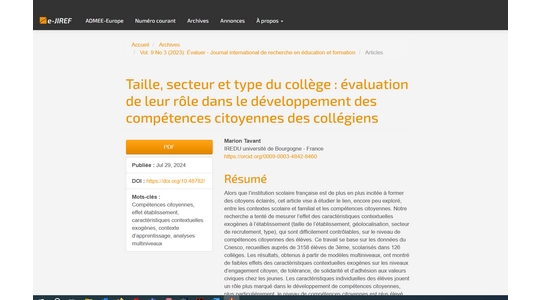- Tavant, M. (2023). Size, Sector, and Type of Middle School: Evaluating Their Role in the Development of Students’ Citizenship Skills. e-JIREF, 9(3), 52‑74. https://doi.org/10.48782/e-jiref-9-3-52
As the French school system is increasingly encouraged to develop informed citizens, this article aims to explore the link, still little studied, between school and family contexts and citizenship skills. Our research sought to measure the effect of contextual characteristics exogenous to the school (school size, geolocation, recruitment sector, type), which are difficult to control, on students’ citizenship skills.
This study is based on data from the Cnesco, collected from 3,158 eighth-grade students in 126 middle schools. The results, obtained through multilevel models, revealed weak effects of exogenous contextual characteristics on students’ levels of civic engagement, tolerance, solidarity, and adherence to civic values. Individual student characteristics played a more significant role in the development of citizenship skills, particularly noting that citizenship skills were higher in disadvantaged or priority education contexts when students came from socioeconomically advantaged backgrounds.
